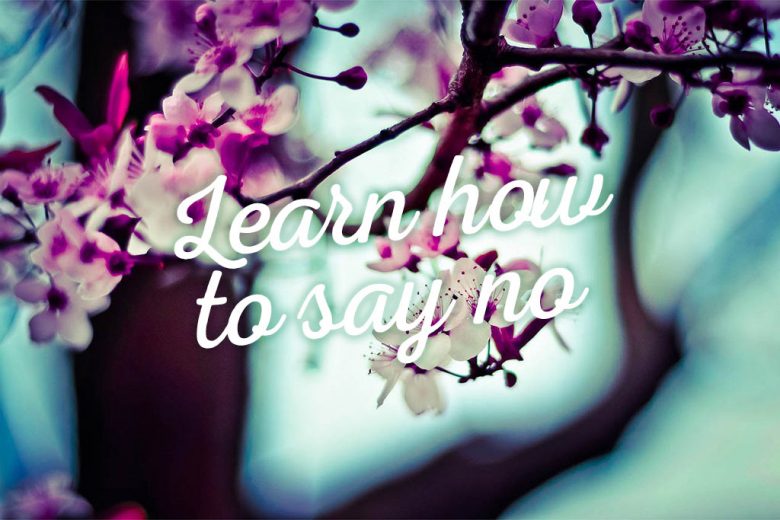Why you need to learn to say ‘no’ more often
Do you often find yourself saying ‘yes’ for things you’d rather not do – only to end up feeling resentful and used? Learn why saying ‘no’ is sometimes the right answer.
Sometimes it can feel like we’re automatically programmed to say ‘yes’ when something is asked of us. We may not actually want to do or provide what is asked of us, nor see a benefit for us in it, but it’s difficult to resist the temptation to be useful, do the right thing, help someone in need, or not disappoint or cause offence.
However, as counsellor and hypnotherapist Susan Leigh explains, over time saying ‘yes’ when we don’t want to can lead to feeling used, unappreciated and resentful.
It’s okay to say ‘yes’ sometimes
Sometimes saying ‘yes’ to things we don’t want to do can be okay. We may feel it’s good manners, have rationalised our reasons for going along with something on this occasion, or feel that it’s important to gain brownie points or be flexible.
But if you sense that it’s becoming a negative pattern, or that others expect you to always agree, you may need to consider the unspoken messages that you’re giving out.
But sometimes a ‘no’ is better
But while a ‘yes’ may sometimes be positive, thoughtful, kind and even tactically wise, there comes a time when you need to start saying ‘no’.
Saying ‘yes’ too often may lead other people to view you as a pushover. It can also damage your relationships and even be unfair on your colleagues, manager, friends, partner or family who may not realise that they are imposing on you.
On the other hand, learning to be assertive and say ‘no’ in an appropriate way means that when you do agree, you are happy to undertake that extra task at work, have sex, accept a drink or even accept a helping of cake. You don’t feel cajoled, bullied or guilt-tripped – and that’s better for everyone.
Why ‘no’ helps you build better relationships
Saying how you feel, even if it’s not what someone wants to hear, means that you’re investing in your relationships and are keen to continue working towards being open, honest and comfortable.
When we’re at ease and prepared to give, share and be real about our feelings, it helps us build trusting and mutually respectful relationships where communication occurs without a second thought. We’re not counting or keeping a record of our good deeds compared to the other person’s or having to think about everything before we speak.
But if, over time we gradually start to notice that we’re the one who always helps out, is obliging, says ‘yes’ when we’d prefer to say ‘no’ and gets nothing in return we can start to feel frustrated and hurt.
Rarely receiving consideration or even a simple ‘thank you’ can ensure that saying ‘yes’ begins to feel a really negative word and that we’re letting ourselves down – and damages our relationships with others.
People don’t always appreciate your ‘yes’
Sometimes other people may not fully appreciate the magnitude of your ‘yes’. The fact that you may have given a massive concession, or a major investment of yourself may have escaped their notice.
They may have simply asked a question which they expected you to answer honestly, and when you said ‘yes’ they assumed that you were happy to do what you were asked – maybe you even appeared enthusiastic about the invitation or request. And they simply took you at our word.
So any great sacrifice you might be making to fulfill your ‘yes’ will go completely unnoticed. And in fact if you are always the person who agrees, others may even cease to recognise you are doing them a favour, and simply take for granted your obliging nature.
It’s important to be honest
Being open and honest, expressing clearly that you’re happy to do something, want to be supportive, spend time together, show willing but need others to reciprocate, understand and appreciate your point of view is a fairer way of experiencing your relationships.
In a healthy professional or personal relationship you communicate well. You express how you feel and where you stand, and are clear about what you want from your partner in return – so everyone is clear on what is expected or needed of them and the people they work with or care about.
You have a responsibility to speak up
And part of maintaining healthy personal and professional relationships is expressing your wishes openly and honestly before it causes serious damage to the dynamics of them. After all, if you continually feel obligated, pressurised or second-guessed into doing things for others, you will soon start to feel resentful.
Always being the ‘good guy’ can quickly wear thin and appear less attractive, especially if it becomes apparent that others automatically assume you will go along with their wishes. You can feel unappreciated, disregarded and inconsequential.
But if you don’t speak up and say how you feel, you have to accept some responsibility for other people’s assumptions. It’s only human that people will ask you do to things if you allow them to, and in many cases they may not even be aware that their requests are imposing on your good nature.
It’s easy to feel resentful of more assertive people
If you’re constantly agreeing to do things that you don’t want to, or aren’t aligned with your own goals, it’s easy to become resentful of friends or colleagues who are more healthily assertive.
You may find yourself looking at other people’s personal and professional relationships and comparing them to your own. It’s hard not to feel envious if you see them apparently having adult conversations, discussing their wishes, compromising and negotiating – and doing what they want to do.
How can they be so free, and you confined to the role of the invisible, easy-going, self-sacrificing giver, with a strong sense of duty and a desire to make others’ lives easier?
You can choose your own role
But you do have a choice. You’re not trapped in any role in life – you can make a decision to change, and learn new strategies to interact with others in the way you’d like to – one that helps you to meet your personal needs and professional goals, without alienating or offending the people around you.
The first step towards this is to reflect on why you have this mindset, and why this pattern has evolved in your relationships. Were our role models people-pleasers who were always compliant? Was disagreement regarded as argumentative, unattractive or unacceptable? Were your views and wishes criticised and dismissed?
Learning to become more confident and express yourself in a positive, assertive way can add significantly to the quality of your relationships and, more importantly, improve your relationship with yourself.
How one client learned to say ‘no’
I remember a client – a top female manger in a male-dominated national company – who was seriously stressed, working long hours with virtually no free time or personal life. She always said ‘yes’ to her manager because she was concerned that if she didn’t he would assume she wasn’t coping and was perhaps not up to the job.
But one evening she was driving home late at night and her boss called and asked her to do an urgent report for him. On this occasion, because she’d worked on her confidence levels and assertiveness, she was able to explain what she was already working on, say she was happy to do the report and then ask him for input on rescheduling her workload to incorporate the new request.
It transpired that he was unaware of her other commitments, was enquiring if she had any spare capacity and, if not would get someone else to do it. His request was dealt with calmly, efficiently and effectively and she avoided going into her old pattern of automatically saying ‘yes’ and then having to work throughout the night.
Now it’s your turn!
So what about you? Are you generally happy with the choices you make and the things you agree to do? Are you satisfied with your relationships and the balance of give and take in your life? Or do you recognise in this article many familiar patterns and feelings?
If so, maybe it’s time you learned to say ‘no’ sometimes – and save your yeses for when you really mean them – for the benefit of everyone in your life.
Susan Leigh practises lifestyle therapy, counselling and hypnotherapy in Altrincham and Cheshire. Find out more on her website.










